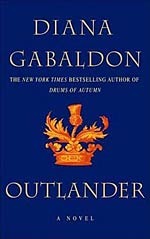
![]() ahmmel
ahmmel
7/13/2013
![]()
My (quite late) June WOGF review is of Diana Gabaldon's Outlander, a fantasy/historical fiction/romance novel about time travel, Scotland, sex, Scottish men, and sex with Scottish men in Scotland after travelling through time. (Yes, my wife recommended this to me. No, I am not Scottish.)
As I am sure the reader has gathered, there is quite a lot of sex in this book. Although romance novels are not my usual reading material, my feelings about the sex scenes are that they fulfill the same purpose as space battles in military SF, or regular battles in an adventure fantasy novel: it's just for fun. Putting the focus on the 'just for fun' elements can result in either an entertaining light read or a dreary slog through yet another orbital skirmish/drawn-out siege/Scotsman. Gabaldon, mercifully, gives us the former.
It helps that the sex scenes are very well done, and surprisingly tasteful (to me, anyway). This is not, to borrow a phrase from Neil Gaiman, a 'one-handed read', although it's hardly PG-rated either. Gabaldon has quite enough to say about 18th-century and 1940s attitudes towards marriage, abuse, consent, and rough sex to keep things interesting, and she is for the most part careful not to let the romance swamp the rest of the story. The sex is, I think, one of the smartest things about the book.
Gabaldon gives us a pretty good flavour of the 18th-century Scottish highlands. I'm not nearly historian enough to say how accurate she is in the details, but a skim of a few Wikipedia articles suggests that she got the Scottish clan system of the time close enough. There were a few irritating historical myths repeated, but not enough to totally derail things. I have a hard time believing that His Majesty's Dragoon Guards were quite the bunch of thugs they were portrayed as in the first two acts, but that aside the characters acted believably for their time periods.
It is a hallmark of bad time travel fiction that the time travellers wander around acting like dolts for at least half of the story before getting used to the local customs. Fortunately, our protagonist is clever enough to avoid this, and we're quickly into situations where she has to use her modern-day knowledge in clever ways. One of the more interesting plot points is that the protagonist doesn't have any particularly detailed knowledge of late 18th century Scotland besides what she's learned in school about Bonnie Prince Charlie. It was really good fun trying to work out how having a non-specialist's knowledge of the period could be used to influence the plot.
Unfortunately, the plot is where things start to fall down a bit. I'm given to understand that this is Gabaldon's first attempt at a novel, and was not written with the intention of publishing it. This shows most in the plotting. The story runs down a number of irritating blind alleys, and there is a great deal of wandering around the Highlands for no particularly compelling reason as far as the story goes. Most egregiously: the protagonist has a bad habit of just plain forgetting about what she and the rest of the characters are trying to accomplish for dozens of pages at a time. This is a pretty admirable first effort, but Gabaldon's plotting skills were clearly not up to scratch the first go around.
Outlander is, on the whole, pretty good escapist fiction. The main characters are well realized, the prose is solid, and the historical flavour and—shall we say pure entertainment elements?—are especially well done. At this point in her writing career, however, it seems that Gabaldon had some trouble with the mechanics of plot. That's quite understandable in a first time author, but the plot troubles make what could be quite a commendable fantasy novel an average effort. I'm given to understand that the plotting improves as the series goes on, so I may give it another shot some day.
Cross-posted on Goodreads.
http://www.goodreads.com/ahammel